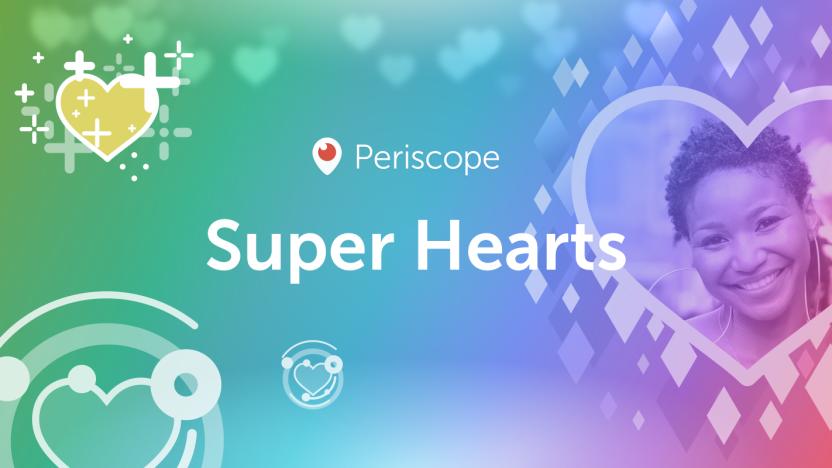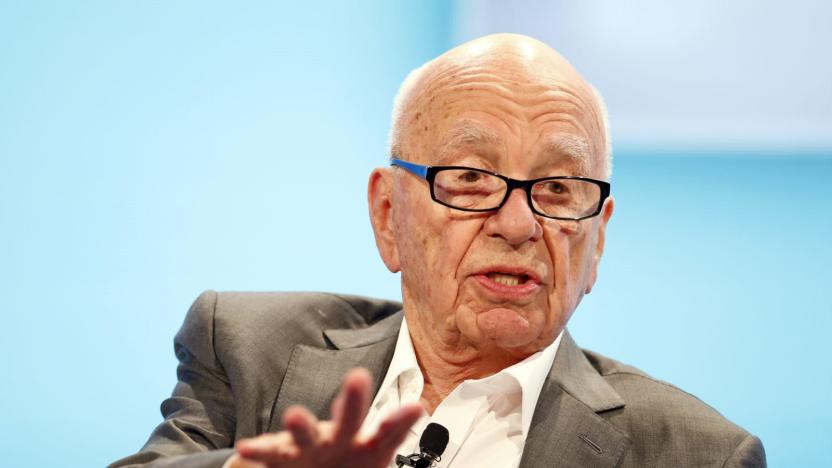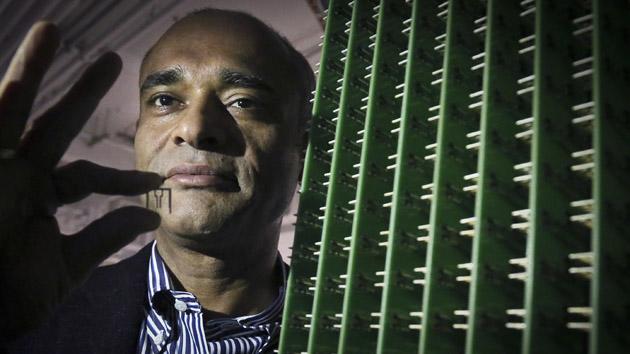broadcasters
Latest

Periscope adds a confusing way to support your favorite streamers
While Facebook is currently winning the livestreaming wars, rival Periscope has its fair share of devotees. The Twitter-owned service hosted 200 million broadcasts in 2016 and close to 77 million hours of live video in the first quarter of this year. Some Periscope broadcasters even draw huge crowds (Amanda Oleander, for example, is an LA artist with over 600,000 followers) with hundreds of hearts flooding the screen. Today, Periscope is announcing a new feature that rewards those broadcasters with more than mere likes. It's called Super Hearts, which are essentially fancy hearts that viewers pay for with real money in exchange for attention. But the real benefit is for broadcasters: Those Super Hearts could potentially turn into cold hard cash.

Ofcom to investigate Sky and 21st Century Fox merger
The UK's media regulator will investigate a proposed merger worth £11.7 billion ($14.6 billion) between 21st Century Fox and Sky. Speaking in the House of Commons, Karen Bradley, the Secretary of State for Culture, Media and Sport, said she had referred the matter because of "public interest considerations" which "warrant further investigation." These include media plurality -- the need for citizens to have access to a variety of independent news sources -- and a "commitment to broadcasting standards." Ofcom has 40 days to investigate and deliver its report, which will undoubtedly shape Bradley's decision to approve or block the deal.

Twitch lets viewers tip more broadcasters by 'Cheering'
To entice top broadcasters to its streaming service (and make a cut from their tips), Twitch recently introduced "Cheering." It lets viewers spend actual cash to purchase "Bits," which they can then lavish on streamers by sending animated chat "emotes." The streamer gets to keep that money, minus Twitch's hefty 30 percent cut. Cheering has been in beta for just 100 broadcasters, but the Amazon-owned company announced that it's now available to all 11,000 or so partner streamers in the US and UK.

Aereo to pay broadcasters $950,000 for copyright claims
As if the situation couldn't get worse for Aereo, the defunct TV streaming service is now set to make a payment to the broadcasters responsible for its downfall. And, all things considered, it's getting off quite easy. According to Bloomberg Business, Aereo has agreed to pay CBS and other television networks $950,000 to resolve copyright claims, although the damages are said to total over $99 million. Simply put, Aereo's only expected to compensate for a little less than a penny on the dollar, a deal that was agreed upon by all parties involved.

Aereo auctioning its web TV tech under broadcasters' watchful eyes
A US bankruptcy judge has declared that Aereo can sell off its technology to the highest bidder, but with a few large exceptions, according to Reuters. First off, the broadcasters who forced the streaming service off the air and into Chapter 11 can oppose any sale they don't like. They'll also be allowed to analyze Aereo's customer records before they're deleted to determine possible damages in further court proceedings. Interest is actually high in Aereo's tech -- despite all the legal problems, there are 17 potential bidders for the auction. However, that presents a dilemma for CBS, NBC, FOX and other broadcasters.

Supreme Court said Aereo is a cable company, so now it wants to be treated like one
Despite Aereo's best efforts, the Supreme Court decided that its service was too much like cable TV and therefore its unlicensed streaming of TV broadcasts were illegal. Now, after putting its service on pause, Aereo has filed a letter with the US District Court saying that since the Court said it's like a cable system, it is entitled to the same statutory license that cable companies pay broadcasters. CEO Chet Kanojia sent a message to users and supporters explaining "The Path Forward" with a link to the letter, but hasn't laid out a timeline for the service's return. That's one of the reason's broadcasters are still fighting the new move, saying (in the same letter) that it's "astonishing for Aereo to contend the Supreme Court's decision automatically transformed Aereo into a 'cable system' under Section 111 given its prior statements to this Court and the Supreme Court." [Image credit: AP]

The Supreme Court heard Aereo's case, whether they understood it could mean everything
We have no doubt the justices of the Supreme Court are well versed and prepared for any copyright law, but do they understand TV or the hows and whys it can be so frustrating sometimes? Like many of us, possibly not that well -- like why HBO can't keep its streaming service up during Game of Thrones? -- which could make reaching a decision in the case between Aereo and the broadcasters seeking to put it out of business especially difficult. During today's oral arguments Justice Antonin Scalia wondered whether the cable- and satellite-only network HBO might be picked up by Aereo's antenna-to-internet setup. The justices were mostly on point, however, needling lawyers for the networks about a previous case for Cablevision's cloud DVR, and how a ruling in their favor could affect cloud internet services.

Aereo chief: We're fighting for consumers' rights to watch TV with an antenna and DVR
Big media may have thought its deep pockets and love of ceaseless litigation would break Aereo's bank and spirit, but the cloud-based DVR company is sticking to its guns. In a statement released just today, Aereo head Chet Kanojia said that his company wouldn't oppose a petition brought against the company by ABC, CBS, Fox and NBC, setting the table for a case in the Supreme Court. Kanojia echoed much of what Cablevision itself expressed in a white paper earlier today, saying that he believes the end goal of this court battle could ultimately strike down a 2008 ruling in favor of Cablevision's cloud DVR tech, which laid the groundwork for many of the cloud-based services we enjoy today. Though Aereo and Cablevision are in different positions when it comes to retransmission fees, both parties argue that the broadcasters' suit, if successful, could slow or even reverse the trend of technological progress, innovation and consumer choice. For Aereo's part, a potential Supreme Court case could also provide a much-needed light at the end of the tunnel -- a final ruling in a recent string of lower court victories that would free up its resources and allow the company to pursue nationwide expansion unburdened. That's if the Supreme Court even decides to hear the case -- it declined to hear an appeal on Cablevision's remote storage DVR in 2009 -- as that decision won't come until sometime in 2014.

Twitch introduces ad-free Turbo subscription service
Popular video streaming site Twitch has announced a new service called Twitch Turbo. For $8.99 a month you can turn off all the ads on the site, get priority customer support, and unlock a special badge, chat colors, and custom emoticons that only Twitch Turbo subscribers can use. Twitch also streams lots of eSports events and other videos that would otherwise be interrupted by commercials.If you subscribe to knock the ads off completely, eligible Twitch broadcasters will still be paid for their views. Twitch says this is "just the beginning of what we hope to offer through Twitch Turbo," and that more "benefits and enhancements" for both viewers and broadcasters (including the official Joystiq Twitch channel) are likely coming soon.

FCC votes in favor of rethinking spectrum holding rules, goading broadcasters into wireless selloffs
FCC meetings can be momentous occasions under the right circumstances, although it's seldom the case that we see the agency pass two potentially far-reaching measures in one sitting, like we just saw on Friday. To start, regulators have voted in favor of a proposal that will review spectrum sale rules and might drop the case-by-case determinations in favor of a more consistent screening mechanism. The reexamination will also consider a change to the ownership rules surrounding wireless frequencies that treats bands below 1GHz differently than those above -- the better to address a chorus of smaller carriers that don't like all the prime spectrum going to the companies with the most existing clout, namely AT&T and Verizon. FCC Chairman Julius Genachowski argues that reform could spur innovation through more competition, although dissenting Commissioner Robert McDowell is worried that consistent rules will somehow create "uncertainty." Side-by-side with the review, the FCC is proposing an incentive-based reverse auction strategy to have TV broadcasters voluntarily give up their spectrum for cellular and data use. The multi-phase approach would have TV providers set the price at which they're willing to sell their spectrum to the FCC; those that just can't bear to part with their airwaves would be corralled into a tighter band range to make for larger available frequency blocks in the auction that follows. As with other FCC proposals, there's likely to be a long interval between the auction vote, the review and any definitive rulemaking, let alone an impact -- auctions by themselves can take years to play out. Still, any success with the measures could head off spectrum crunches while simultaneously preventing any solutions from consolidating too much power and creating their own problems. [Tower photo via Shutterstock]

Aereo unveils free trial and new prices for its NYC-based internet TV service (video)
Broadcast-streaming startup Aereo is busting out tweaked price plans and a free trial for New Yorkers to try the service gratis for an hour a day. $8 per month will buy you unlimited access, live pause, rewind and 20 hours online DVR, while $12 a month doubles your storage allocation to 40 hours. Annual customers can pay $80 (plus tax, naturally) to get a deep discount off the monthly price, but for the commitment-phobic viewer, 24-hours access can be purchased for a dollar, or you can try the service for an hour each and every day without need of a sign up. Unfortunately, due to legal wrangling, it's only available within the boundaries of New York City on any iOS, OS X, AppleTV or Roku devices. There's PR and Video after the jump if you're yet to be convinced -- but think, now you catch all of Good Morning America as you walk down Broadway.

TV stations predictably sue Aereo over antenna-to-internet streaming plans
We had to wonder if Aereo / fka Bamboom would actually be able to launch its $12 / month antenna-based live TV over the internet service before the networks tried to sue it out of existence and the answer is in: no. Ahead of Aereo's planned March 14th launch, AllThingsD reports several New York Area broadcasters including Fox and PBS have filed suit in US District Court to stop it from getting off the ground. Put simply, they don't believe copyright law allows Aereo to retransmit their OTA broadcasts on the internet without obtaining a license from them to do so, whether it uses one large antenna or an array of tiny antennas (pictured above) -- one for each subscriber -- as it says it will. Clearly Aereo disagrees, however we don't recall that argument working out so well for Zediva. Hit the source link to read the entire complaint in PDF form for yourself or just peep a press release from the National Association of Broadcasters after the break, we'll let you know if Aereo has any response.Update: Check out Aereo's response, also included after the break. Just as predictably, it "does not believe that the broadcasters' position has any merit and it very much looks forward to a full and fair airing of the issues."

UK temporarily giving LTE spectrum to cameras for 2012 Olympics, tells carriers not to worry about it
You might recall that British regulator Ofcom recently got things in order for an auction late next year of Old Blighty's 2.6GHz spectrum for 4G use, but it turns out that spectrum's going to make a quick pit stop before reaching its final destination. Broadcasters at the London Olympics have been given the green light to use the bandwidth -- which will have already been sold by the time the games kick off in mid-2012 -- for wireless cameras, with the government saying it's fairly certain that carriers wouldn't have had an opportunity to deploy LTE in that spectrum by then anyway. Though Ofcom's original spectrum utilization plan from last year didn't call for using 2.6GHz, it apparently got a wake-up call from the Vancouver games, which revealed higher demand for both wireless cameras and 3D broadcasts than the agency had anticipated -- and unlike carriers, which are expected to pay billions of pounds sterling for LTE rights, Ofcom will be extending use of the bandwidth to broadcasters during the Games gratis. Awfully kind of them, isn't it?

Spectrum cash-out option might still be on the table for FCC, broadcasters
Silly us for thinking this issue had been drawing to a close! Indeed, rumors are swirling again that the FCC is looking into the concept of getting television broadcasters to trade in some spectrum in support of the nation's universal broadband initiatives -- initiatives for which significant additional airspace is likely needed, and for which the Commission is expected to file its master plan to Congress next month. The latest information from BusinessWeek says that companies might be offered the opportunity to share in the monetary spoils of any auction that would come out of reclaimed spectrum, a privilege usually reserved for the government's coffers alone. It's unclear whether the move would be voluntary, "voluntary," or compulsory, but any strong-arm move on the part of the Fed is likely to get some hellish pushback from the nation's broadcasters -- they cherish their spectrum as much as they ever have and many feel as though they're finally on the cusp of capitalizing on the promise of mobile TV. Even with significant cash incentives, this could easily become a battle royale for years to come.

A few broadcasters are moving back to UHF
Warranted or not, there has always been a stigma against UHF stations -- greatest Weird Al Yankovic movie ever -- so maybe that had something to do with many broadcasters electing to move back to their original frequency assignment after the digital transition. Whatever the reason, some broadcasters quickly realized the advantages of UHF over VHF when it comes to ATSC and have petitioned the FCC to move back. This is good news for everyone having problems pulling in those signals, but it really makes us wonder why the FCC didn't just standardize on UHF when it had the chance. At any rate, the moral of the story is that if you're having problems receiving your favorite VHF stations after the transition, don't hesitate to be vocal about it; because who knows, maybe they'll actually listen and move to UHF as well. The cool part is that moving frequencies is a pretty painless process thanks to virtual channel numbers -- unless of course you're using Windows Media Center.

Channel Four on Demand: Sorry, Mac users
Mac users in the UK have been waiting a long time (like, years) for Channel 4's Video on Demand "Catch Up" service to come to their platform, and finally, after long last, the day is here. And they're sorry, Mac users -- they say so with the cute video above. Of course, the reason why it's now compatible is because it's the Flash-based web version linked above, and not actually the desktop app that Windows users had. But late and web-based is still better than never, right? Right?At any rate, it's nice to know they care enough to make a funny video. The site features Channel 4 content for up to 30 days after broadcast, so if you happen to miss Hollyoaks, Skins, or Fat Pets (I'm just kidding -- being an ignorant American, I have no idea what those shows are or if they're any good), there's your chance to catch up.

Consumer demand for HD content on the rise in Middle East
It's no surprise to hear of consumer demand swaying decisions in America in regard to HD content, but it seems as if the cries for more high-def are making their way east. According to the Dubai World Trade Centre, "discerning consumers in the region are driving broadcasters to expedite their shift towards high definition transmission and upgrade their existing facilities at a faster pace." The 2007 industry report by the Satellite Industry Association also "indicated a huge upswing in consumer demand for more high definition (HD) content." As it stands, broadcasters in the Middle East are just starting to employ HD technology, but given the rate at which areas such as Dubai adopt newfangled technology, we wouldn't be surprised to see guests at the Burj Al Arab enjoying a hundred or so HD options in the not-too-distant future.[Image courtesy of Volja]

FCC gives broadcasters more flexibility in 2009 digital TV cutover
Just a few months back, the FCC approved a set of rules for the 2009 digital TV transition, but now the entity is apparently okaying even more guidelines that will give US broadcasters "more flexibility in making the switch to digital television from traditional analog signals." More specifically, the new rules would allow some stations to make a "phased transition" to digital broadcasting, and furthermore, these stations will also "be allowed to reduce or terminate their analog service before the February 17, 2009 deadline for the transition if doing so is necessary to achieve their transition." According to FCC Chairman Kevin Martin, the new rules are being enacted in order to "provide broadcasters the flexibility they need while at the same time ensuring that any disruption to over-the-air viewers is minimized to the fullest extent possible." Still, even those affected by the cutover will have ample time to pick up a converter box, and considering that some stations may now start the switch before February of '09, acting soon is looking better all the time.










